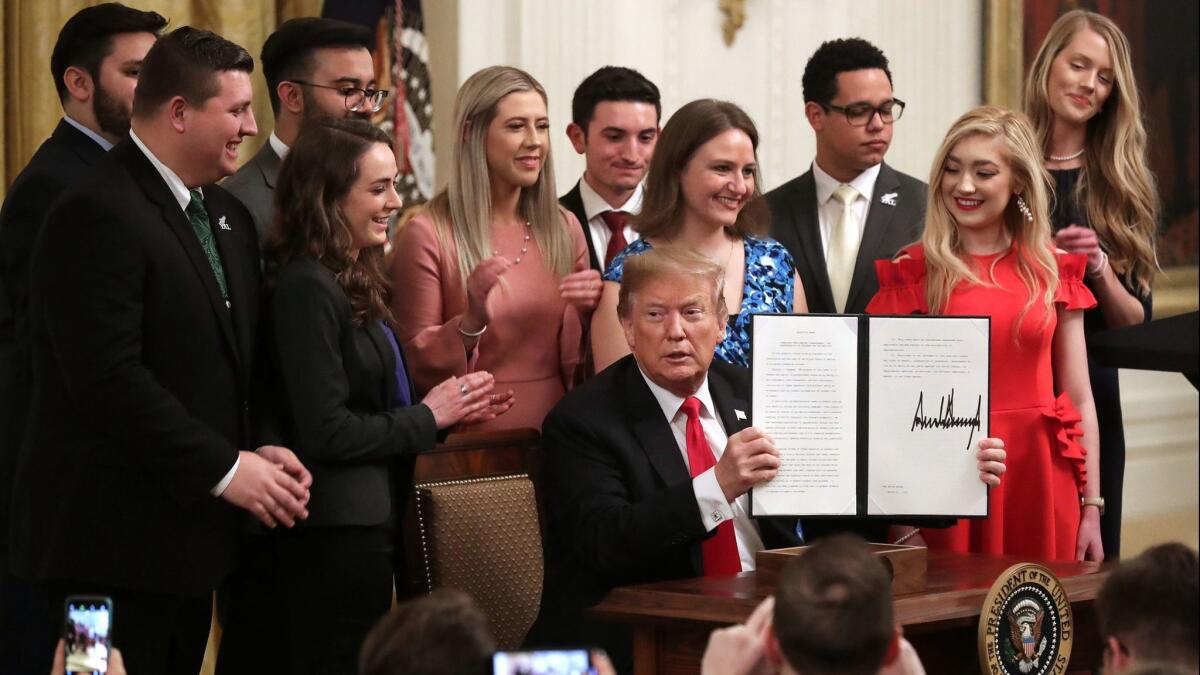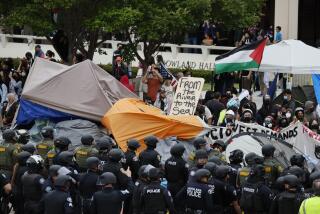Op-Ed: Trump’s executive order on college free speech is unconstitutional

A key section of President Trump’s latest executive order, issued Thursday, aims to protect free speech on campus. But in reality it does little to further that goal. Meanwhile, the order is so vague and ambiguous, it makes compliance by colleges and universities extremely difficult — and it is almost certainly unconstitutional.
The executive order’s key provision with regard to free speech is just one sentence: “The heads of covered agencies shall, in coordination with the Director of the Office of Management and Budget, take appropriate steps, in a manner consistent with applicable law, including the First Amendment, to ensure that institutions that receive Federal research or education grants promote free inquiry, including through compliance with all applicable Federal laws, regulations, and policies.”
It is tempting to shrug and say that this changes nothing. Colleges and universities receiving federal funds already must comply with all applicable “laws, regulations and policies” and what university doesn’t believe in “free inquiry.”
But what makes the executive order so disturbing is that it doesn’t set clear guidelines for what colleges and universities need to do to comply, leaving them uncertain of how to ensure that their federal funding is not in jeopardy.
Indeed, the examples that President Trump has pointed to of campuses failing to protect free speech make this vaguely worded executive order particularly troubling.
In February 2017, provocateur Milo Yiannopoulos was scheduled to speak on the UC Berkeley campus. Extensive security had been arranged at significant cost to the campus. Nevertheless, 150 radical Antifa protesters engaged in violence and vandalism on campus. Then-Chancellor Nicholas Dirks felt he could not ensure campus safety in light of the ongoing riot. He canceled the scheduled speech and asked that it be rescheduled when even greater security could be provided.
There is no crisis concerning free speech on campuses in the United States. Every day on virtually every campus, speeches are given without incident.
Trump quickly responded with a tweet threatening to cut off federal funds if Berkeley “does not allow free speech.” But the school did not violate free speech by postponing Yiannopoulos’ speech under these extraordinary circumstances. The legal and moral duty to protect free speech coexists with the legal and moral duty to protect students, staff and faculty. Is the purpose of the executive order to withdraw funds from campuses if they ever declare an unlawful assembly and postpone a scheduled event?
Trump’s more recent example, which he mentioned in announcing his executive order, concerned Hayden Williams, a conservative activist who was punched while working a recruitment table on the Berkeley campus. Neither Williams nor his assailant are students, staff or faculty at the school. As soon as university officials learned of the assault, they condemned it and conducted an investigation that led to the arrest of the suspected assailant. Is the purpose of the executive order to withdraw federal funds from a campus because two outsiders had an argument on campus that led to an assault?
This kind of uncertainty is what makes the order unconstitutional. The Supreme Court long has held that any conditions on federal funds must be clearly and explicitly stated. This executive order obviously does not meet this requirement.
Beyond that, the Trump executive order is unnecessary. There is no crisis concerning free speech on campuses in the United States. Every day on virtually every campus, speeches are given without incident, including some by very controversial speakers. Walk across either of our campuses on just about any day of the week, and the cacophony of diverse speakers is readily apparent.
To be sure, there are isolated instances of campus officials making bad decisions concerning expression. All campuses should ensure that the rules governing campus speech are viewpoint neutral, transparent and easy to understand. There is a need for more education about basic free speech principles.
Enter the Fray: First takes on the news of the minute »
Many difficult issues need to be addressed. At what point does speech that attacks people on the basis of race, nationality, sex, religion and other legally-protected categories become sufficiently “severe or pervasive” to create a discriminatory learning environment under federal law? When does speech over social media constitute harassment that can be the basis for discipline? How much do campuses need to spend to ensure safety when there are controversial speakers?
Trump’s executive order addresses none of these hard questions. At best it is an act of political grandstanding that imposes no new obligations on campuses. But any effort by federal agencies to threaten campuses with the loss of federal funds would be an unconstitutional abuse of power.
Erwin Chemerinsky is the dean of the UC Berkeley Law School. Howard Gillman is the chancellor of UC Irvine. They co-chair the national advisory board for the University of California National Center on Free Speech and Civic Engagement, and are the authors of the book “Free Speech on Campus.”
More to Read
A cure for the common opinion
Get thought-provoking perspectives with our weekly newsletter.
You may occasionally receive promotional content from the Los Angeles Times.










